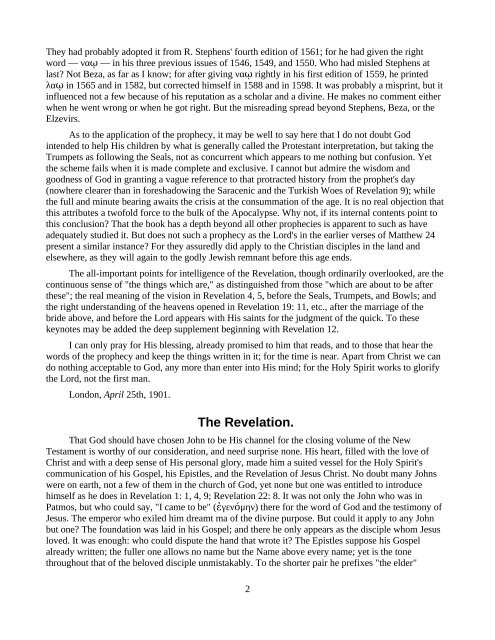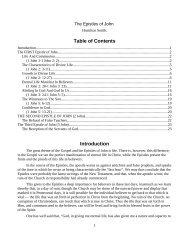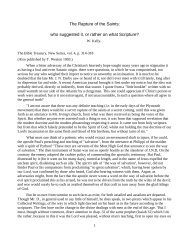An Exposition of Revelation .pdf
An Exposition of Revelation .pdf
An Exposition of Revelation .pdf
Create successful ePaper yourself
Turn your PDF publications into a flip-book with our unique Google optimized e-Paper software.
They had probably adopted it from R. Stephens' fourth edition <strong>of</strong> 1561; for he had given the right<br />
word — να ῳ — in his three previous issues <strong>of</strong> 1546, 1549, and 1550. Who had misled Stephens at<br />
last? Not Beza, as far as I know; for after giving να ῳ rightly in his first edition <strong>of</strong> 1559, he printed<br />
λα ῳ in 1565 and in 1582, but corrected himself in 1588 and in 1598. It was probably a misprint, but it<br />
influenced not a few because <strong>of</strong> his reputation as a scholar and a divine. He makes no comment either<br />
when he went wrong or when he got right. But the misreading spread beyond Stephens, Beza, or the<br />
Elzevirs.<br />
As to the application <strong>of</strong> the prophecy, it may be well to say here that I do not doubt God<br />
intended to help His children by what is generally called the Protestant interpretation, but taking the<br />
Trumpets as following the Seals, not as concurrent which appears to me nothing but confusion. Yet<br />
the scheme fails when it is made complete and exclusive. I cannot but admire the wisdom and<br />
goodness <strong>of</strong> God in granting a vague reference to that protracted history from the prophet's day<br />
(nowhere clearer than in foreshadowing the Saracenic and the Turkish Woes <strong>of</strong> <strong>Revelation</strong> 9); while<br />
the full and minute bearing awaits the crisis at the consummation <strong>of</strong> the age. It is no real objection that<br />
this attributes a tw<strong>of</strong>old force to the bulk <strong>of</strong> the Apocalypse. Why not, if its internal contents point to<br />
this conclusion? That the book has a depth beyond all other prophecies is apparent to such as have<br />
adequately studied it. But does not such a prophecy as the Lord's in the earlier verses <strong>of</strong> Matthew 24<br />
present a similar instance? For they assuredly did apply to the Christian disciples in the land and<br />
elsewhere, as they will again to the godly Jewish remnant before this age ends.<br />
The all-important points for intelligence <strong>of</strong> the <strong>Revelation</strong>, though ordinarily overlooked, are the<br />
continuous sense <strong>of</strong> "the things which are," as distinguished from those "which are about to be after<br />
these"; the real meaning <strong>of</strong> the vision in <strong>Revelation</strong> 4, 5, before the Seals, Trumpets, and Bowls; and<br />
the right understanding <strong>of</strong> the heavens opened in <strong>Revelation</strong> 19: 11, etc., after the marriage <strong>of</strong> the<br />
bride above, and before the Lord appears with His saints for the judgment <strong>of</strong> the quick. To these<br />
keynotes may be added the deep supplement beginning with <strong>Revelation</strong> 12.<br />
I can only pray for His blessing, already promised to him that reads, and to those that hear the<br />
words <strong>of</strong> the prophecy and keep the things written in it; for the time is near. Apart from Christ we can<br />
do nothing acceptable to God, any more than enter into His mind; for the Holy Spirit works to glorify<br />
the Lord, not the first man.<br />
London, April 25th, 1901.<br />
The <strong>Revelation</strong>.<br />
That God should have chosen John to be His channel for the closing volume <strong>of</strong> the New<br />
Testament is worthy <strong>of</strong> our consideration, and need surprise none. His heart, filled with the love <strong>of</strong><br />
Christ and with a deep sense <strong>of</strong> His personal glory, made him a suited vessel for the Holy Spirit's<br />
communication <strong>of</strong> his Gospel, his Epistles, and the <strong>Revelation</strong> <strong>of</strong> Jesus Christ. No doubt many Johns<br />
were on earth, not a few <strong>of</strong> them in the church <strong>of</strong> God, yet none but one was entitled to introduce<br />
himself as he does in <strong>Revelation</strong> 1: 1, 4, 9; <strong>Revelation</strong> 22: 8. It was not only the John who was in<br />
Patmos, but who could say, "I came to be" ( ἐγενό μην)<br />
there for the word <strong>of</strong> God and the testimony <strong>of</strong><br />
Jesus. The emperor who exiled him dreamt ma <strong>of</strong> the divine purpose. But could it apply to any John<br />
but one? The foundation was laid in his Gospel; and there he only appears as the disciple whom Jesus<br />
loved. It was enough: who could dispute the hand that wrote it? The Epistles suppose his Gospel<br />
already written; the fuller one allows no name but the Name above every name; yet is the tone<br />
throughout that <strong>of</strong> the beloved disciple unmistakably. To the shorter pair he prefixes "the elder"<br />
2






